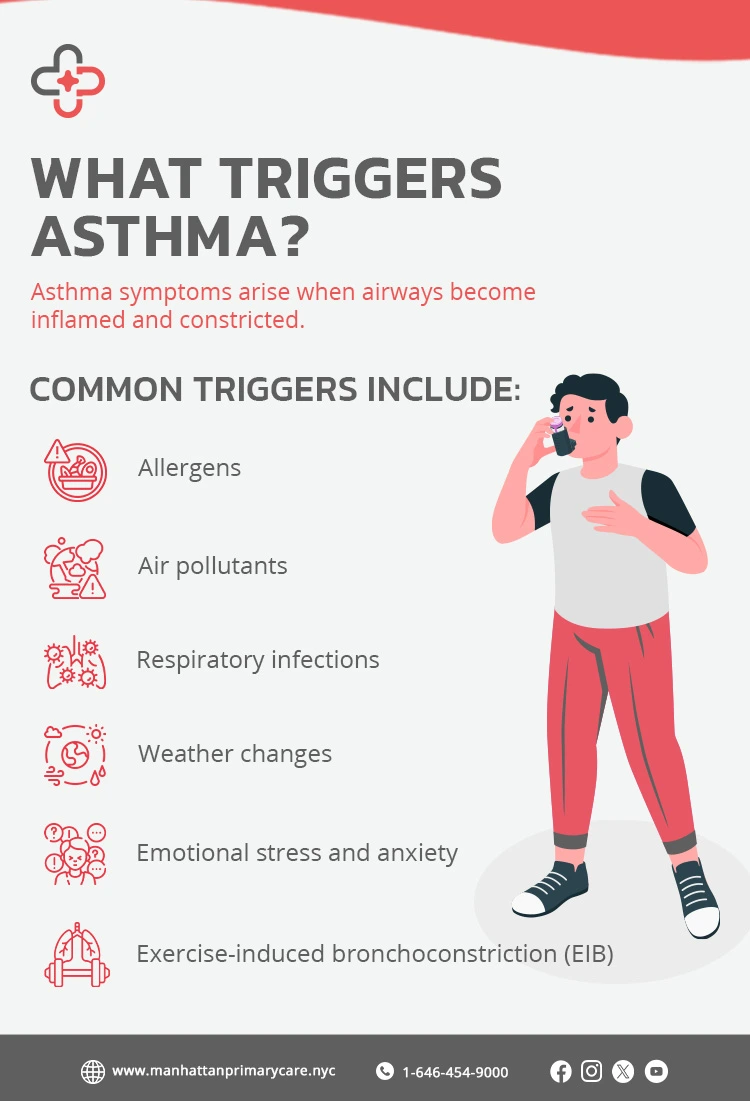Asthma is a common but often misunderstood respiratory condition. While some believe it is entirely hereditary, others attribute it solely to environmental factors. In reality, asthma results from a complex interplay of genetics and external influences. Understanding these factors is essential for individuals managing the condition, those concerned about inherited risks, and anyone seeking to minimize exposure to potential triggers.
Is Asthma Genetic? Understanding the Role of Inheritance
Asthma is a chronic respiratory condition characterized by inflammation and narrowing of the airways, leading to difficulty in breathing, wheezing, and coughing. While no single gene causes asthma, numerous studies confirm that genetic factors significantly contribute to asthma susceptibility.
The Genetic Link
- If one parent has asthma, the child has approximately a 25% risk of developing the condition. If both parents have asthma, the risk increases to 50% (News Medical, 2024).
- Twin studies suggest that identical twins have a 70% likelihood of sharing the condition if one twin has asthma, indicating a strong hereditary component (Wikipedia, 2024).
- Several genes associated with asthma have been identified, including DPP10, GRPA, and SPINK5, which influence inflammation and immune response (GAAPP, 2024).
While genetics can predispose individuals to asthma, inheritance alone does not determine whether a person will develop the disease. Environmental factors play a crucial role.
Is Asthma Hereditary or Caused by Environmental Factors?
Asthma development is influenced by both genetic predisposition and environmental exposures.
How Do Genes and Environment Interact?
- Individuals with a family history of asthma may have a higher baseline risk, but they may never develop symptoms unless exposed to specific triggers.
- Common environmental factors that contribute to asthma include allergens (pollen, dust mites, pet dander), air pollution, respiratory infections, and occupational irritants.
- Epigenetic changes, which are modifications in gene expression influenced by environmental exposures, can also affect asthma risk. This means lifestyle and surroundings play a significant role in disease development.
Thus, while asthma is not purely genetic, hereditary factors can increase sensitivity to environmental triggers.
Can You Get Asthma as an Adult? Late-Onset Asthma Explained
Many believe asthma is a childhood disease, but adult-onset asthma is a well-documented phenomenon.
Can You Develop Asthma Later in Life?
Yes, asthma can develop at any age. Adult-onset asthma often arises due to:
- Respiratory infections that cause persistent lung inflammation.
- Hormonal changes (common in pregnancy and menopause).
- Occupational exposure to chemicals, fumes, or allergens.
- Allergies that trigger asthma symptoms over time.
- Obesity, which increases systemic inflammation and affects lung function.
Late-onset asthma may be more severe and persistent compared to childhood asthma, often requiring long-term management.
What Triggers Asthma?
Asthma symptoms arise when airways become inflamed and constricted.


Common Triggers Include:
- Allergens (pollen, pet dander, mold, dust mites)
- Air pollutants (smoke, fumes, chemicals, strong odors)
- Respiratory infections (colds, flu, sinus infections)
- Exercise-induced bronchoconstriction (EIB)
- Weather changes (cold air, humidity, seasonal shifts)
- Emotional stress and anxiety
While genetics influence susceptibility, exposure to these triggers often dictates whether an individual develops asthma symptoms.
Is Asthma Contagious? Dispelling Myths About Transmission
Asthma is not contagious, and it cannot be spread from person to person like a cold or flu. However, families often share environmental conditions that contribute to asthma development.
- Children raised in homes with smoking, high pollution, or allergen exposure are more likely to develop asthma.
- Certain respiratory infections can mimic asthma symptoms but do not cause asthma itself.
- While asthma runs in families, it is due to shared genetics and environmental factors, not transmission.
Asthma Risk Factors
Certain individuals are more likely to develop asthma due to a combination of genetic and environmental factors.
Key Risk Factors Include:
- Genetic Predisposition: Family history of asthma, allergies, or eczema.
- Environmental Exposure: Air pollution, allergens, secondhand smoke, workplace irritants.
- Respiratory Infections: Frequent viral infections in infancy or early childhood.
- Obesity: Linked to systemic inflammation and airway constriction.
- Lifestyle Factors: Smoking, lack of physical activity, or exposure to strong chemicals.
Not everyone with these risk factors will develop asthma, but they contribute to overall susceptibility. Chronic Disease Management plays a crucial role in helping individuals monitor their condition and adopt effective treatment strategies.
Conclusion
Asthma is influenced by both genetic and environmental factors. While genetic predisposition increases risk, external triggers largely determine symptom development. Understanding these influences is crucial for effective asthma management.
Individuals with a family history should monitor symptoms closely and reduce exposure to asthma triggers. Early diagnosis through medical consultation leads to better asthma management.
Though genetics play a role, lifestyle choices and environmental factors significantly impact asthma development. If you or a loved one struggle with asthma, consult Manhattan Primary Care today for expert guidance and a personalized treatment plan.
Frequently Asked Questions
Can a person with no family history of asthma still develop it?
Yes, asthma can develop without a family history due to environmental triggers like pollution, allergens, infections, or occupational exposure.
Does the severity of asthma change with age?
Yes, asthma can worsen or improve over time. Some children outgrow symptoms, while others experience increased severity in adulthood due to hormonal changes, infections, or long-term exposure to triggers.
Can asthma symptoms be silent or go unnoticed?
Yes, some people experience silent asthma, where inflammation is present without noticeable wheezing. Instead, symptoms like persistent coughing, chest tightness, or fatigue may occur, leading to delayed diagnosis.
Can managing gut health improve asthma symptoms?
Yes, gut health influences the immune system. A balanced diet rich in probiotics and fiber may help reduce inflammation and improve respiratory health, potentially easing asthma symptoms.
Can asthma worsen during pregnancy, and does it affect the baby?
Yes, pregnancy can worsen or improve asthma symptoms. Poorly controlled asthma can reduce oxygen supply to the baby, making regular monitoring and treatment essential.
Can asthma medication lose effectiveness over time?
Yes, long-term use of some asthma medications may reduce their effectiveness, especially if overused or not adjusted properly. Regular medical reviews help maintain optimal asthma control.
Disclaimer
This blog is for informational & educational purposes only and does not intend to substitute any professional medical advice or consultation. For any health-related concerns, please consult with your physician, or call 911.
